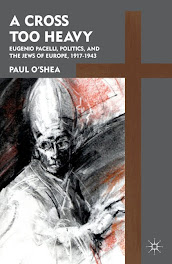ADSS
1.88 Alfredo Pacini, Charge d’Affaires Warsaw, to Luigi Maglione, Sec State.
Reference: Report 250 (AES
4778/39)
Location and date: Warsaw,
10.07.1939.
Summary statement: Reports
of troubles in Germany and in Poland on account of the language used during
religious services in the minorities regions.
Bishops have made provisions to this effect. Stanislaw Adamski (Katowice) has banned the
use of German in services in the diocese.
Language: Italian
Text:
I feel it my duty to inform
your Eminence about an order given by Bishop Stanislaw Adamski, Bishop of
Katowice, regarding the use of the German language in the churches of his
diocese (1).
As it is known, in the
Archdiocese of Gniezno and Poznan, in the Diocese of Culma [Chelmno] and even
more in that of Katowice, there are German speaking communities for which
religious services have always been held in German: sung mass, sermons,
lectures, catechism etc: for the administration of sacraments there is even
more freedom, as not only in the above mentioned Dioceses, but all over Poland
all possible languages are used …
This state of affairs has
been in force for a long time, and in Article 23 of the Concordat with Poland
(2) in the Diocese of Latin rite any change regarding sermons, supplementary
prayers and instructions courses without a special authorisation given by the
Latin Rite Bishop’s Conference is prohibited.
Now, while in Poland, as
Cardinal Hlond assures me, the Bishops had scrupulously followed this
prescription, it seems that in Germany – where the Polish speaking populations
had the same privilege – this use has in many cases been abandoned; hence
protests and threats of reprisals against the Germans in Poland.
These reprisals recently
have become so frequent, from both sides, and have taken on such proportions
that there was no respect for persons or things or scared places and the very
churches become battlefields. Then
Monsignor Adamski, Bishop of Katowice, in whose diocese more than in others
these acts were taking place, published a Pastoral Letter in very stern terms
at the end of this May, with the hope of remedying these evil practices. Bishop Adamski writes that this letter
brought peace: but others say that “it had the adverse effect”, so that, on 22
June, in a meeting of deacons of his entire Diocese, he gave the order by word
of mouth, to stop all religious ceremonies in the German language, permitting
it only when giving the sacraments, in funeral services and in public meetings
of German organisations.
The reasons given by Bishop
Adamski for this order are the following:
1. The clergy complained of
the difficulties they were encountering on account of German language
ceremonies.
2. The Protestants and other
religious sects, using only the Polish language, were vaunting their patriotism
against the Catholics who continued to use the German language.
3. The political and
nationalist associations were agitating for the exclusive use of the Polish
language: if not appeased they would start trouble even inside the churches, as
had already happened in many cases.
Not ever twenty-four hours
had elapsed since the measures were applied when a letter reached Bishop
Adamski from Cardinal Bertram, Archbishop of Wroclaw (3) asking if it was true
that the Katowice Curia intended to abolish the use of the German language in
the churches of the diocese. I do not
know what Bishop Adamski replied, I only know that the above-mentioned by a
decree dates 27 June suspended all Polish devotions, I his large archdiocese,
ordering that, in place of sung Mass with Polish hymns and Polish sermon, a low
Mass without hymns be introduced. The
decree mentions the possibility of reverting to Polish ceremonies in more
serene times.
The reasons put forward by
Cardinal Bertram are more or less the same as those given by Bishop Adamski for
the suppression of the German language in Poland. Bishop Adamski, in a second letter written to
me on this subject on 01.07.1939 says that, in consideration of the good
results produced by his verbal order, he was going to confirm it in writing
directly to the clergy, without, however, publishing it in any newspaper or
magazine, not even in the Official Bulletin of the Diocese.
Up to now the Nunciature has
not received any protest form the German Minorities: it is believed that
protests will come from other quarters, but I have no positive information.
Bishop Adamski, who it seems,
has mentioned something about this in previous Episcopal Conferences, write to
me that he will present the entire question at the next Conference which will
probably be held in September: but in the meantime Cardinal Hlond writes to me
that he has received requests for the abolition of German in his parishes in
Poznania, Kaszczor, Rawicz, Swiecichoa and Miasteczki: this I believe is also
the case in the Diocese of Culma. But it
seems that these Bishops do not let themselves be pushed and manage things with
the calm which the case requires.
If there are other
developments I shall not fail to inform your Eminence.
Notes:
(1) Stanislaw Adamski
(1875-1967), bishop of Katowice 1930-67.
(2) Concordat with Poland, Article
23: “Any change of language used in the Diocese of Latin rite for sermons,
prayers, supplementary prayers and instructions, except those of sacred sciences
in seminaries, shall be made only by special authorisation given by the
Conference of Bishops of the Latin Rite.” Acta
Apostolicae Sedis, 02.06.1925, p283.
(3) Adolf Bertram (1859-1945),
Cardinal Archbishop of Wroclaw (Breslau) 1914-45.




No comments:
Post a Comment
You are welcome to post a comment. Please be respectful and address the issues, not the person. Comments are subject to moderation.